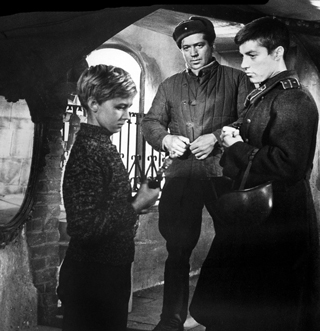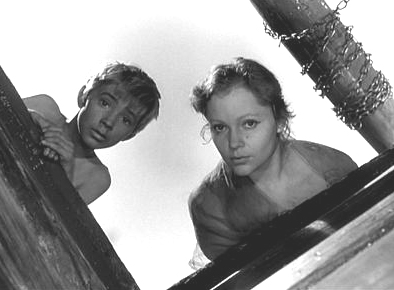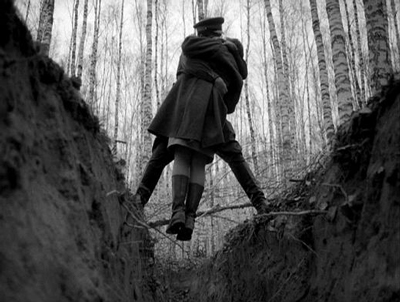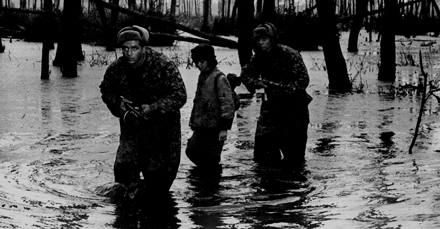
 |
|
|
|
When it comes to the Russian director Andrei Tarkovsky, film enthusiasts either worship his films or lose their way in what can seem to be interminable philosophical meditations. Tarkovsky's subject matter ranges from the historical to the fantastic yet always addresses the human condition. Considering the difficulties of maintaining a career in the Soviet system, the director's body of work has an impressive consistency. Tarkovsky may have been aware that his 1986 The Sacrifice would be his final film. A visual motif with a small tree in that film forms a symmetrical "bookend" with the opening shot of the director's first feature from twenty-four years earlier, Ivan's Childhood. 
As an aspiring film student Andrei Tarkovsky waited for several years for his first feature assignment. His short film of 1956 is a polished adaptation of Ernest Hemingway's story The Killers, in Russian. This was just prior to the "cultural thaw" that allowed some Soviet filmmakers to make pictures with less restrictive ideological content. Mikhail Kalatazov's The Cranes are Flying and Grigori Chukhraj's Ballad of a Soldier found international acclaim. Both pictures showed young people caught up in the terrible consequences of war. Tarkovsky's Ivan's Childhood is also about WW2. It takes place even closer to the combat zone, during a Russian counteroffensive. 14 year-old Ivan (Nikolai Burlyaev) swims the breadth of a river on his return from a hazardous solo scouting mission for Captain Kholin (Valentin Zubkov). A committed child-soldier, Ivan has lost his entire family to the Germans. Ivan's comrades desperately need the information he brings but also feel guilty for putting him in such jeopardy. Kholin orders Ivan to attend military school but only makes the boy angry: he's functioning as a man and demands the right to serve. Captain Kholin and a younger officer are both attracted to Masha (Valentina Malyavina), a soldier in the medical corps. The Captain entices Masha into a birch grove for a kiss, but does not protest when his rival has her transferred away from the front. A new military action requires a touchy scouting mission, and Kholin reluctantly allows both Ivan and the younger officer to accompany him. The grown men wait in the pre-dawn marsh while the much smaller Ivan goes on ahead. German snipers seem to be everywhere. Will any of them return? 
Fans of Andrei Tarkovsky will be delighted to discover that Ivan's Childhood is an emotionally satisfying triumph of direction and camera artistry. At 95 minutes it is only half as long, and moves along much faster, than several of his later epics. We're instead confronted by vibrant characters and expressive visuals created on location. Young Nikolai Burlyaev is phenomenal as Ivan, a child who moves and acts like a dedicated, weary adult soldier. Fished out of the river, Ivan must talk tough to convince the young Soviet lieutenant that he's a real spy on a real assignment. Almost as in the Rudyard Kipling story Kim, Ivan keeps track of troops and tank tallies by counting the berries and twigs he's tucked into his pocket during his recon. The boy collapses into sleep like an old man -- and the lieutenant carries him to his cot as if he were a baby. Four years later, Nikolai Burlyavev would play an even more challenging role for Tarkovsky, the young bell maker in Andrei Rublev. It's almost humorous to see the tough soldiers expending every argument they can think of to convince Ivan to go back to school -- cajoling, paternal guidance, military authority. Ivan isn't convinced, as his combat experience equals theirs, at least in terms of raw courage. They bring him magazines and repair a phonograph to play records, one of which is about a girl named Masha. Every scene in Ivan's Childhood is a memorable character confrontation, and a mini-masterpiece of visual proficiency. Tarkovsky and his cameraman Vadim Yusov conjure phenomenal deep-focus B&W images; they would collaborate again on Andrei Rublev and Solaris. The battleground is bathed in a perpetual light fog, so that flares drop from the sky like ghost-fireflies. The mission behind the German lines takes place in a grove of trees submerged in knee-deep water. Death is everywhere yet never seems to happen on screen; the most sympathetic of the soldiers is shot before the recon even begins. 
Tarkovsky said that he wasn't proud of a sequence in a burned church -- ruined religious icons were a cliché in war-themed Eastern-bloc filmmaking. A highly expressive image frames Ivan amid the burned rafters of the building, all of which point at him in stark silhouette, suggesting little Ivan's utter vulnerability. Later, Yusov's camera roams with Masha through the grove of birch trees, as Kholin tries his best to seduce her. All he gets is a kiss, but it's something special -- he holds her off the ground while straddling a long trench under the trees. It's as if he is kissing her over an open grave. Ivan's Childhood is generally patriotic but free of heavy-handed ideological preaching. Its status as a film of the Cultural Thaw is more than a mere lack of propaganda. The characters are allowed to have private needs, wants and desires, interior lives separate from their identity as Soviet citizens. Although obviously dedicated soldiers, only Ivan defines himself exclusively in collective terms. At several junctures Tarkovsky breaks from his realistic format for a dream sequences, Ivan's strange memories of his mother (Irina Tarkovskaya) and playtime with other children. The visions are entirely alien to Ivan's present reality. One involves a happy ride on an apple wagon, in which the rear-projected background is a negative image. The screenplay by Vladimir Bogomolov and Mikhail Papava finds its tragedy in Ivan's dedication to his work. His childhood has been scalded away and his emotional strength has been redirected into the fight that has become his entire existence. For Ivan, preparing for a future beyond the battleground is unthinkable. There is only fighting and dying. 
Tarkovsky ends his film amid the ashes of Hitler's bunker in Berlin. Sober Russian troops regard the charred body of suicidal Nazis Joseph Goebbels, his poisoned family, and a general who has likewise killed his entire family. Just as we are learning Ivan's fate, the film returns once again to a dream sequence that could be right out of Terrence Malick's The Tree of Life. Ivan's mother walks mysteriously away, gesturing toward the camera. Tarkovsky doesn't simply commemorate the patriotic dead, he invests them with a human dimension that makes their sacrifice seem all the more overwhelming. The Criterion Collection's Blu-ray of Ivan's Childhood is yet another B&W marvel. Somebody found a perfectly preserved element for this beautiful picture -- every shot is like a teaching example for fine B&W photography. Grain is at a minimum and it doesn't look as if any digital process was required to suppress it. This is just a rich, rich negative. Criterion's disc producer Curtis Tsui has organized several valuable extras. Tarkovsky expert & author Vida T. Johnson speaks at length about the director, and new interviews encourage actor Nikolai Burlyaev and cameraman Vadim Yusov's memories on a number of topics. The fat insert booklet contains an illuminating essay by Dina Iordanova, Between Two Films. Tarkovsky's own written comments on Ivan's Childhood are reprinted, along with his father Arseny Tarkovsky's poem Ivan's Willow, which is cited as an inspiration for the film's tone.
On a scale of Excellent, Good, Fair, and Poor,
Ivan's Childhood Blu-ray rates:
Reviews on the Savant main site have additional credits information and are often updated and annotated with reader input and graphics. Also, don't forget the 2011 Savant Wish List. T'was Ever Thus.
Review Staff | About DVD Talk | Newsletter Subscribe | Join DVD Talk Forum |
| ||||||||||||||||||